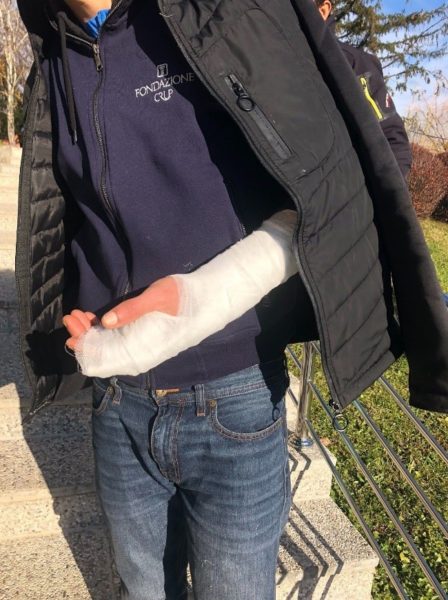Two Algerian men left Bihać (BIH) on December 4, 2018, by foot, crossing the border to Croatia with the intention of continuing to Italy. They had walked for five days through Croatia and on December 9, between 3 and 4 am, they left the forest and stepped onto a road. At this time it was snowing, and they had absolutely no idea where they were, though they had passed a village a short time before.
They intentionally went onto the road because they were looking for the police. One of the respondents was very sick, he had injured his knee and knew that he could not make it all the way to Slovenia. As a result, they decided that it would be better to give up and turn themselves in. They believed that the police would bring them back to Bihać.
“When I went out of the jungle, there was countryside. I looked for the police because I felt too cold. Then they came, what is normal because if you go out of the jungle, police will arrive.”
At this point, none of them considered that they could be subject of police violence.
“I believed that they would bring me to Bihać, but I didn’t know that they would beat me. When I went out of the van [at the border], they beat directly.”
Shortly after they stepped onto the road, a police car arrived. Three officers stopped and asked them several questions:
“Where are you from?”
– “Algeria.”
“Do you speak any English?”
– “No.”
These were the only questions the respondents recalled being asked during their entire interactions with the Croatian officers that night. While they had to wait for a van, they were frisked and one of the three officers gave them cigarettes. All police officers that they interacted with were male.
After 30 minutes, the and two officers arrived. It was a smaller dark blue van with the words “POLICE” written on it. The two of them had to enter it and were brought to a nearby police station.
There, they switched the vans and two new officers were now in charge of them. The second van was a bigger white van, also with the words “POLICE” written on it. They had to stay inside the police van at the police station for three hours.
“They did not let us leave. It was so cold, very cold, inside.”
There was a window in the van from which they could see what was happening outside, but due to the nighttime, the respondents couldn’t describe any of the surrounding details of the station. Then, they had to change to another van, parked directly next to their former one. During their time at the station, they signed no documents and had no photos or fingerprints taken. They didn’t request asylum at the police station or at any other point during their experience because they had heard from their friends that it was impossible:
“You can not claim asylum in Croatia.”
They were later brought in a 30-minute drive back to a secluded section at the Bosnian−Croatian border outside of Velika Kladusa, and had to get off the van one by one. There were four officers at the border waiting for them, wearing black balaclavas and carrying batons. With those, they hit the two individuals on their upper thighs, shoulders, and hands. One of the respondents was hit by an officer with his fists. He couldn’t see anything, but was also beaten with batons and kicked in his back. The four officers were standing in a line some meters apart from each other outside the van and positioned close to a stream which runs along the border.
The respondent who had to get off the van first, described that he had just enough time to pick up his backpack before the officers started to beat him. At one point they took off his shoes and threw them away. When he went to pick them up and bent over he was hit twice on the back with a baton:
“When we arrive there [at the border] I went out of the van first. When I went out, they beat me and told me, “take your shoes off” and then continued to beat me [ imitating his body bent and a policeman beating him with a stick], then they threw my shoes away and then I crossed [ the river]. Fortunately, I ran because [ the police officer ] hit me with so much violence.”
He then ran away and got wet while crossing the stream. Later, he managed to find his shoes again, but nonetheless ended up walking back with only one of them, as he had lost the second one somewhere in the mud in the darkness of the forest.
The other respondent described that after his friend was taken out of the van the officers closed the door, and he was waiting inside for 10 minutes. He didn’t have time to take his bag when he finally had to get off. It had clothes, shoes, and a phone inside. They had no money taken from them, however one of the respondents had one of his phones broken and then thrown away into the night by one of the officers.
After being pushed-back by the Croatian officers, the two men had to walk approximately one hour back to Velika Kladuša (BIH). It was approximately five degrees Celsius in that night, and the ground was wet from all the rain earlier that day.


